
When the mercury soars, you take longer to fall asleep and your sleep is more intermittent. Although the ideal room temperature for sleeping is 65 degrees Fahrenheit, indoor temperatures during summer can rise to over 100 degrees Fahrenheit in some parts of the country.
The obvious solution is to turn on your air conditioning, but there are other options that can improve summer sleep—and keep your energy bills in check.
1. Block out heat.
Prevent heat from building up in your home in summer. The National Sleep Foundation (NSF) recommends using blinds to keep sunlight out during the day. Awnings and dark or heavy curtains can also keep your home cool. Close windows when the temperature outside is hotter than inside. When it's cooler outside open windows to bring in cool air and improve air circulation.
2. Control humidity.
For some people, humidity is more unbearable than heat. Use dehumidifiers and extractor fans to suck moisture out of the air. Also, reduce activities that fill your home with moisture, such as boiling lots of water, or taking long, steamy showers. In summer cook outside when you can or prepare quick meals indoors, and take short, warm or cool showers instead.
3. Use fans more effectively.
To get a more cooling effect place your fan by a window or behind a bowl of ice. Or, consider installing a ceiling fan directly over your bed. Keep your bedroom door open to improve air flow when using a fan.
4. Take a cool shower.
Right before going to bed, take a cool shower to lower your body temperature, recommends the NSF. While a hot shower may also work for some people, it raises the humidity, which could make you even more uncomfortable.
Another option is to rub ice along your skin; however, don't leave the ice on any part of your skin for a prolonged period.
5. Install a bed cooler.
These devices can help to improve summer sleep, and they use less energy than air conditioning. Bed coolers come in different varieties: The ChiliPad®, for instance, is a mattress pad that utilizes water instead of air and a thermostat to adjust the temperature of the bed while you're sleeping. The Bedfan® removes heat that gets trapped between your body and your sheets. Both devices can also help women suffering from hot flashes due to menopause get a better night's sleep.
5. Change your sleepwear.
Not comfortable sleeping in the nude, which is ultra cooling? Consider wearing pajamas made from materials that wisk away perspiration, such as CoolMax®, advises the NSF. They are also useful for women suffering from hot flashes.
6. Sleep in the basement.
When summer sleep isn't possible above ground, go underground. Heat rises, so basements are much cooler than the first and second floors of your home.
7. Use high-grade cotton sheets.
Cotton sheets with a high thread count (200 or above) are cooler than sheets made from regular cotton, polyester-cotton, or polyester. They are also more affordable than they used to be in the past.
8. Eat cool foods.
Lay off the hot, heavy meals during summer, especially at dinner time. Lighter, juicier fare helps to lower your body temperature. Good choices include salad greens, fruits such as citrus, watermelon and grapes, and lean fish such as cod, hake, halibut, and sole. Also, drink six to eight glasses of cold water a day.
9. Adjust your fitness schedule.
Avoid rigorous or high-intensity exercise within six hours of your bedtime, advises the American Academy of Sleep Medicine. Exercise can disrupt your sleep in general by making you more alert. But, it also elevates body temperature, which takes at least six hours to begin to drop, making summer sleep even more difficult.
10. Freeze your bedding and sleepwear.
Place your sheets, pillowcases and sleepwear in a freezer bag and put them in the freezer when you go to work in the morning or come home in the evening. At bed time, you'll have chilled sleepwear and a soothing, cool surface that helps you catch up on your summer sleep.





